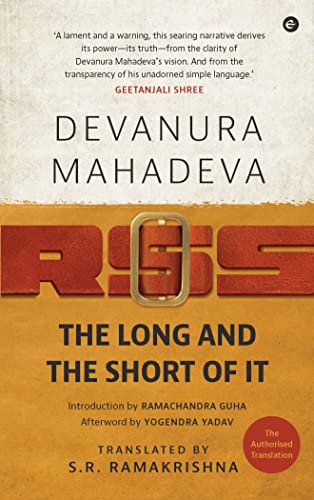Why I Picked This Book?
“RSS – The Long and the Short of It” is a booklet about the Rashtriya Swayamsevak Sangh, a powerful organization that has a significant impact on India’s social, religious, and political situation. The organization is the driving force behind many policy decisions aimed at making India a Hindu Rashtra. While the debate on whether the organization is good or bad is ongoing, it is essential to understand what RSS stands for. And to know what the author has to say about RSS, I decided to read this book
The Book
RSS- The Long And The Short Of It, talks about what RSS stands for, views of RSS on nation, caste system, and the idols of the founding fathers of the RSS. The author quotes the statement of Golwalkar, Savarkar, and many others, who were either a member of RSS or some other right-wing organizations to give the readers an overview of what it stands for. And what are RSS’s views on nationalism, caste system, Constitution, and Freedom and how they see India as a nation.
Thought Leaders of RSS
German race pride has now become the topic of the day. To keep the purity of the Race and its culture, Germany shocked the world by her purging the country of the Semitic Races – the Jews. Race pride at its highest has been manifested here. Germany has also shown how well nigh impossible it is for Races and cultures, having differences going to the root, to be assimilated into one united whole, a good lesson for us in Hindusthan to learn and profit by.
Golwalkar on Hitler and Nazism
The very fact that Germany or Italy has so wonderfully recovered and grown so powerful as never before at the touch of Nazi or Fascist magical wand is enough to prove that those political ‘isms’ were most congenial tonics their health demanded.
Savakar on Nazism
The book talks about the role RSS played post-independence, how it has grown over the years, and how it is calling the shots in the present government on various policy decisions which impact the citizens of the country. The firm belief of RSS in the varna system, the complete disregard of Constitution and Constitutional values. The author provides an example of a letter dated 14 March 1948 by soon-to-be president Dr. Rajendra Prasad wrote to Home Minister Sardar Vallabhbhai Patel.
I am told that RSS people have a plan of creating trouble. They have got a number of men dressed as Muslims and looking like Muslims who are to create trouble with the Hindus. Similarly, there will be some Hindus among them who will attack Muslims and thus incite Muslims. The result of this kind of trouble amongst the Hindus and Muslims will be to create a conflagration.
Letter of Dr. Rajendra Prasad to Sardar Patel
Ideology
RSS has very scant regard for individual freedom as the author points out.
Golwalkar rules out allowing swayamsevaks any discretion. Choices, he says, don’t exist for them. This is distressing because the RSS pulls young children into its organizational fold. It doesn’t make humans out of them; instead. It creates inhuman robots called swayamsevaks.
From the book
This is what present government and it ideological parent organization want from the citizens of India, complete obedience without any questions. We have seen for ourselves also how the members of civil societies, students, NGOs, journalists, or anyone raising questions or asking for accountability are being incarcerated. The aim is to silence any dissent.
The decision to bring CAA, abrogate art 370, implement GST, and dilute many laws which were meant to protect and safeguard the environment, forests, and tribal and Dalit people are all being done to centralize the power. Centralization of power means total control over the people and resources of the country to utilize them as per their wish.
Conclusion
The author points out the danger of the ideology which is inspired by Nazism and Fascism, and which believes in the supremacy of the Hindu religion and wants to make India a “Hindu Rashtra”. A short and crisp read to understand the central idea of RSS and what they want to achieve and how they want to achieve it.
“RSS – The Long and the Short of It” is a concise and informative read that provides an understanding of RSS’s central idea and what it wants to achieve. It may inspire readers to delve deeper into RSS’s history, ideology, and role in shaping India as a nation.
About The Author
One of Kannada literature’s foremost contemporary writers, Devanura Mahadeva is also a public intellectual whose force of conviction and uncompromising integrity has placed him at the centre of social conversations. As a young student, Devanura was drawn to the Rashtriya Swayamsevak Sangh, which he left to work towards building Karnataka’s socialist and Dalit rights movements.
Devanura’s output as a writer is a small, intense corpus, with every work creating ripples across the Kannada literary firmament. From his short story ‘Amasa’ (1973), written while he was an MA student, to his novel Kusumabale (1984), which received the Sahitya Akademi Award, or his novella Odalala (1984), every piece of his work is a recognised classic
Our Verdict
RSS- The Long And The Short Of It, is a short, crisp and informative book on RSS. It tells the readers what RSS stand for, who are its ideological heros, how RSS see India as a nation and what are its views on nation, Constitution, individual freedom and caste system. A great book to start if someone wants to know about RSS.
